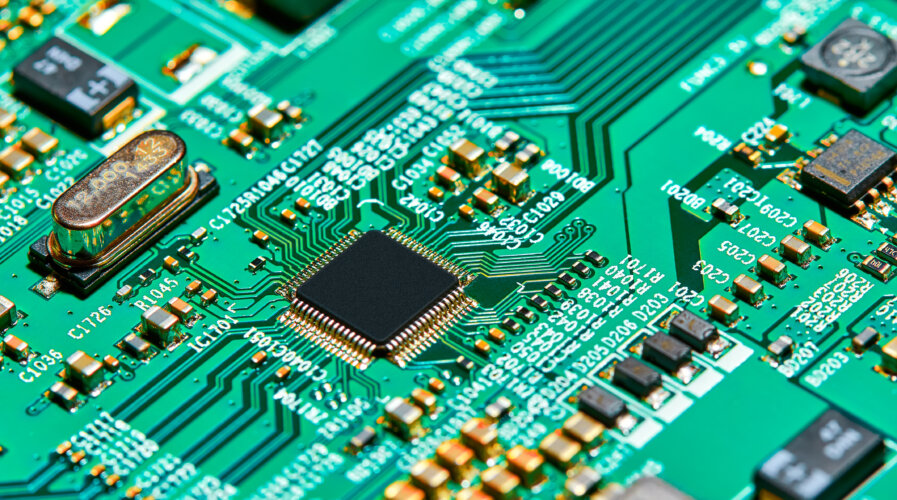
Adding Nvidia and AMD to a field that includes Apple and Qualcomm only adds to Intel’s challenges. Source: Shutterstock
Watch out, Intel; Nvidia & AMD are eyeing the PC chips market
- Nvidia is using Arm tech to challenge Intel in PC chips, escalating the semiconductor rivalry with Intel.
- AMD is also in the process of developing Arm-based PC chips, scheduled for release in 2025.
- Adding Nvidia and AMD to a field that includes Apple and Qualcomm only adds to Intel’s challenges.
Nvidia Corp, the dominant force in AI chips, is apparently expanding its reach to challenge Intel Corp and its longtime stronghold of personal computer (PC) chips. Reports have surfaced that the AI chip giant is harnessing Arm Holdings’ technology for developing central processing units (CPUs) capable of running Microsoft’s Windows operating system.
Allegedly, Advanced Micro Devices (AMD), Intel’s main rival, is also developing chips for PCs and, just like Nvidia, would be utilizing Arm’s technology. The developments by Nvidia and AMD, if proven true, would mean that both tech giants may offer PC chips by 2025.
Qualcomm has been designing Windows laptop processors since 2016 under an exclusivity agreement with Microsoft, which is set to expire in 2024. With the upcoming expiration, new players can enter the market and challenge Qualcomm’s dominance.
Nvidia vs Intel: A new PC chip race on horizon
Nvidia’s latest pursuit is part of Microsoft’s effort to help chip companies build Arm-based processors for Windows PCs. According to preliminary third-quarter data from research firm IDC, Microsoft’s plans aim for Apple, which has nearly doubled its market share in the three years since releasing its own Arm-based chips in-house for its Mac computers.
However, it’s worth noting that Nvidia has previous experience with Arm-based chips, specifically for data centers. In 2020, Nvidia had plans to acquire Arm Holdings for US$40 billion, but the deal was eventually terminated in early 2022. Should the fresh rumors be true, Nvidia will join other tech giants, including AMD and Qualcomm, in the race to develop Arm-based PC chips.
Adding to that, the data from IDC shows that Apple’s market share has nearly doubled since the introduction of its Arm-based Apple Silicon three years ago. In short, the performance and energy efficiency of Apple’s in-house Mac chips have proven superior to Intel’s offerings. That is why Nvidia, AMD, and Qualcomm’s efforts could shake up a PC industry that Intel long dominated but which is under increasing pressure from Apple.
“Apple’s custom chips have given Mac computers better battery life and speedy performance that rivals chips that use more energy. Executives at Microsoft have observed how efficient Apple’s Arm-based chips are, including with AI processing, and desire to attain similar performance,” one of the sources told Reuters.
With M2 Ultra powering the new Mac Pro, the Mac transition to Apple silicon is now complete, revolutionizing the laptop and desktop experience. Source: Apple
Reuters also indicated that Microsoft has been encouraging the involved chipmakers to build advanced AI features into the CPUs they are designing. The company envisions AI-enhanced software, such as its Copilot, to become an increasingly important part of using Windows. To make that a reality, forthcoming chips from Nvidia, AMD, and others must devote the on-chip resources.
Double whammy for Intel
Intel faced its first setback in recent times when Apple disclosed its move from Intel’s x86 processors to Arm-based processors for the Mac, a shift that proved highly successful in terms of performance improvements and market share.
Although Intel remains the world’s biggest vendor of processors based on the in-house x86 architecture, if Nvidia and AMD end up making PC chips, it will serve as a blow to Intel and place them on the same turf as Apple’s M-series silicon for Macs.
Until now, Qualcomm has been the primary company developing Arm-based processors for what Microsoft categorizes as “always-on” PCs, which are more energy-efficient, compact in size, and include cellular connectivity. Nvidia’s entry into the Arm-based PC sector could bring about a significant change.
The company, already a leader in GPU technology, capitalized on the AI surge to achieve a trillion-dollar market valuation through its H-series graphics engines. Considering tech giants across the board, including Google and Microsoft, strive to integrate more AI capabilities into their hardware, Nvidia’s proficiency in this domain could be an attractive proposition for PC manufacturers.
Nvidia has the potential to provide Windows PCs with a significant advantage. This is particularly noteworthy as Apple, which typically remains reticent about AI, is currently in a state of urgency and is prepared to invest substantial sums to bridge the gap with its rivals, according to Bloomberg.
READ MORE
- 3 Steps to Successfully Automate Copilot for Microsoft 365 Implementation
- Trustworthy AI – the Promise of Enterprise-Friendly Generative Machine Learning with Dell and NVIDIA
- Strategies for Democratizing GenAI
- The criticality of endpoint management in cybersecurity and operations
- Ethical AI: The renewed importance of safeguarding data and customer privacy in Generative AI applications


